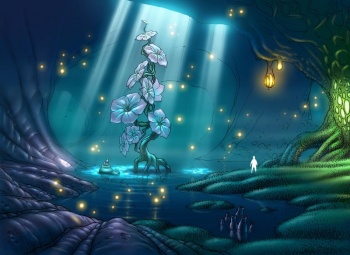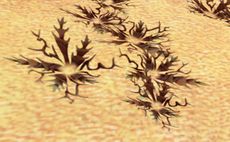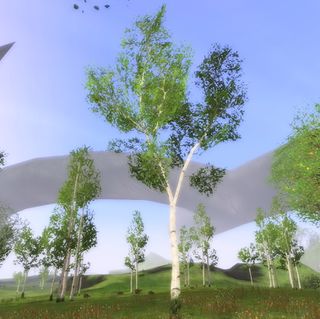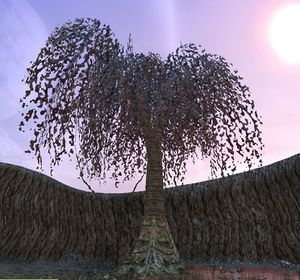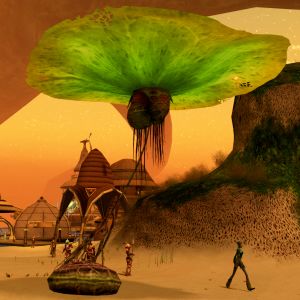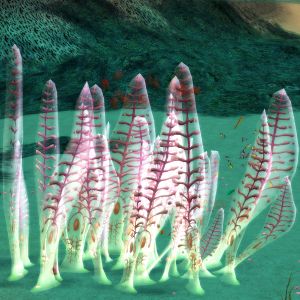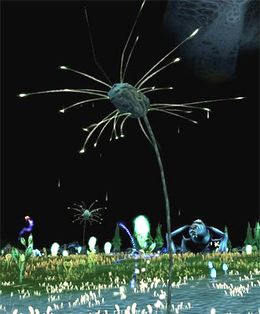From EncyclopAtys
This is an index of all the flora, excluding intelligent plants, that can be found on Atys.
Contents
By ecosystem
This section lists the flora of Atys as it appears to the laymen homin. Note that many of this 'flora' isn't even really plants, but actually fungi or even immobile animals. But you'd have to dabble in botany a bit before you realise this.
The flora you may run into varies immensely based on the ecosystem of the continent you're in. Only a few plants appear in multiple ecosystems (like the Olansi tree that appears in both desert and lakelands). Thus the flora is classified by ecosystem.
Desert
- Bothaya - often appears as a large wooden spike, sometimes with small palm-like trees growing from it.
- Botoga - a large and thick desert tree, growing in twisted shapes with leaves forming an umbrella shape.
- Kioraï - a small plant growing in shady places of the oases.
- Loojine - a small desert tree resembling a colourful ball trapped in a cage.
- Olansi - a thin but high palm-like tree.
- Olash - somewhat resembles the olansi, but is smaller and has larger leaves.
- Papalexi - an almost ghost-like transparent tree.
- Salvola - grow together forming thorny carpets on sawdust.
- Savaniel - a cross between a tree and a bush, doesn't reach high but provides a large area with shade.
Forest
- Alinea - a needle-bearing tree, often comes in the shape of two trees twisting around eachother.
- Angelio - a small tree with beautiful white bark and pink blossoms in spring.
- Arino - a fern-like shrub with large leaves.
- Balogna - a dense bush whose leaves twist upwards in a spiral.
- Bolka - giant tree used by Matis for homes and other buildings
- Campana - a small herbaceous plant whose flowers are part of the composition of “Dandelion wine”.
- Crolice - comes in the form of huge branches twisting from the ground.
- Dorio - a dorotea in earlier stage of growth.
- Dorotea - a thicker and even higher cousin of the Dorio, tallest tree on Atys.
- Fongice - a huge mushroom taller than most homins.
- Fragaria - a small herbaceous plant producing very sugary red fruit.
- Irena - a low bush, reaching no higher than a tall homin.
- Iriscea - named faham when growing in the Jungle.
- Maydea - a grass growing in the wettest areas of the Forest.
- Pepo - a plant of the same family as the sparàn of the Lakes.
- Pocea - a grass whose tiny seeds gather in a pendulous plume.
- Salina - a low and think tree, providing shade over a large area.
- Volacea - an herbaceous plant species whose size and colour differ according to variety.
Jungle
- Alao - a variety of arinish that looks like a small palm-like tree.
- Alezao - another variety of arinish, apparently with a mini-Faneng in it's center.
- Araj - large dark fern-like shrub that is too a variety of arinish.
- Arinish - a large fern-like shrub of the same family as the olansis found in Lakes and Desert.
- Ba-Che - the grass known as pocea in the Forest.
- Batao - notably average-looking tree, sometimes named “salvo”.
- Dorao - a slender tree with a smooth trunk which forms the vault of the Jungle.
- Faham - an herbaceous plant with a lovely compound flower.
- Faneng - large pillar-shaped growth.
- Fu-Shia - a perennial plant with hallucinogenic properties.
- Gonju - a perennial plant with large star-shaped orange flower.
- Jayazeng - small sad-looking tree, with many branches in all directions that perpetually hang downwards.
- Li-Un - an herbaceous whose three varieties share the same flower.
- Lu-Tuo - three herbaceous creeping plants living in symbiosis.
- Taleng - large amounts of this can make an impregnable forest.
- Vu-Che - an herbaceous plant growing in bushes where their helical stems intertwine.
Lakes
- Bambú - large amounts of this can make an impregnable forest.
- Bulrush - grass bearing a red spindle-shaped spikelet.
- Cahbacan - an aquatic plant looking like a large floating mushroom.
- Carnuft - a shrubby plant of insubstantial appearance, highly flammable.
- Cleitwytt - an underwater transparent seaweed of ghostly appearance.
- Cuach - a perennial herbaceous plant with many medicinal properties.
- Cúr - a moss that proliferates on some shaded headlands and allows other plants to grow.
- Dule - a seaweed of webfoot shape, eaten in salads in summer along with saltorns.
- Feadag - a red seaweed used to make a dye of the same colour.
- Flyner - a large round leaf that appears as if it would be blown away were it not anchored to the ground.
- Gimlet - a seaweed that grows very supple tendrils, used to braid fishing lines.
- Liosta - a small elegant perennial plant whose funnel shaped flower is of various colours.
- Locharn - those long wet hair hanging from the walls are algae.
- Lochmair - a semi-aquatic grass with diuretic and digestive properties.
- Loramn - a very common plant whose small white flowers have, once infused, soothing and relaxing virtues.
- Maërl - a very common variety of brown seaweed used for its healing properties.
- Magairlín - a plant whose root's shape greatly amuses Trykers.
- Manhart - large shrubbery, often branching in multiple directions over a large area.
- Nadóir - an alga of bent funnel shape which once dried enters the composition of a cutaneous disinfectant.
- Napell - an extremely toxic herbaceous plant with blue-purple flower clusters.
- Olansi - the only (false) tree in the subtropics, somewhat smaller than its cousin of the desert
- Praic - a plant also known as “bow of the wreck” for having been used as a bow on some Tryker boats.
- Rimse - a a fan-shaped seaweed, brown or gray and colours speckled.
- Saccha - a tall alga producing a green dye used by artisans.
- Sailtree - a double crown of leaves sometimes floating with the currents.
- Saltorn - a cross-stemmed seawood in the shape of tiny ladder growing among dules.
- Sparàn - a curious succulent plant that looks like a much filled purse laid on the ground.
- Stol - a tall aquatic plant known as the “angler's stool”.
- Suvue - a legume that produces pods filled with small edible seeds.
- Trumperer - low trumper-shaped shrubs, barely reaching higher than a tall homin.
- Trysúl - an aquatic plant that likes dark waters.
- Weedling - comes in the form of huge branches twisting from the ground.
- Wigweed - a bulbous aquatic plant anchored to the bottom of the lake thanks to its root filaments.
- Wyttcran - a
Prime Roots
- Bomton - a
- Cocoa - also known as Cokamool, appears to be a large immobile shell creature.
- Dziku - also known as Amoeba, as it appears like a large transparent luminescent single-celled creature.
- Fungao - gigantic mushrooms, the size of a small tree.
- Fyta - a
- Jiang - a
- Jibung - a
- Lulumindra - smaller version of the Lumindra
- Lumindra - large thin tree whose 'leafs' at the top are luminescent stalks.
- Plumash - also knows as Ploomweed, a low shrub whose flowers resemble a luminescent fluffy ploom.
- Plun - appear as huge floating jellyfish with plant stems hanging from them.
- Rotoa - Full name Rotoa Bravichi, named after famous botanist Lenardi Bravichi, the only real Prime Roots tree, it has a twisted trunk covered in large flowers.
- Soil of the Prime Roots - a
- Spone - a
- Topha - also knows as Toopetz, consists of large thin upright stems with luminescent ends, sometimes bend.
- Topil - a
By classification
This section attempts to give a proper botanical classification of the flora of Atys.
According to matisian botanist Lirni Gillo There are 8 main botanical families ● Evergreen plants ● Fruit trees ● Grasses ● Herbs ● Intelligent Plants ● Mushrooms ● Roots ● Summer blooming plants
However modern botanists such as Komi the Nameless have reviewed his works and insist on a different classification with 10 main families
- Evergreens
- True plants (trees)
- True plants (herbs)
- Rhyzomes (underground plants and roots)
- Conifers
- Feather-plants
- Fungi
- Algae
- Plazmoid plants
- Intelligent plants
Evergreen Plants
- Alinea
True plants
Trees
- Alinea
- Angelio
- Batao (Salvo)
- Bolka
- Botoga
- Dorao
- Dorio
- Dorotea
- Irena
- Jayazeng (Alewo)
- Loojine
- Rotoa Bravichi
- Salina
- Savaniel
Herbs
- Arinish
- Arino
- Balogna
- Campana
- Fragaria
- Kioraï (Takoda)
- Lochmair
- Maydea
- Pepo
- Pocea
- Suvue
- Trysúl
- Volacea
Rhyzomes
Conifers
Feather-plants
- Plumash
- Topha
Fungi
- Fungao
- Fongice
- Lumindra
Algae
Plazmoid plants
- Dziku
- Papalexi


